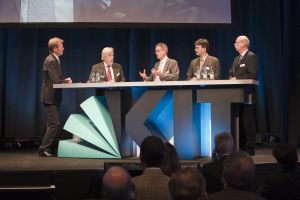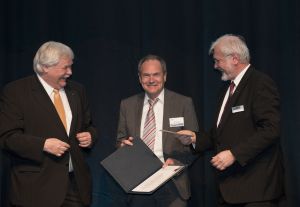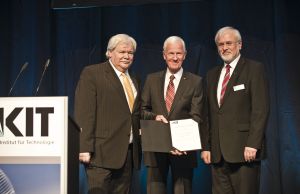IT infrastructures and the management of large data volumes, also called big data, for research and industry were in the focus of the annual reception of Karlsruhe Institute of Technology (KIT) that took place yesterday evening for the third time at the University of Arts and Design (HfG). According to KIT Presidents Professor Eberhard Umbach and Professor Horst Hippler, future information technologies will not least play a central role in the energy turnaround.
IT and arts met in the opening of the event by the performance of “A.U.A.”, a group of resident artists of HfG’s Institute for Postdigital Narrativity. Via real-time analyses of the recordings of 3D cameras in the auditorium, the guests determined the path of a marble in a multi-level channel.
One year ago, KIT’s annual reception took place under the impression of the reactor accident at Fukushima. In his welcome address, KIT President Eberhard Umbach pointed out that it had been impossible at that time to predict the consequences of this disaster for future energy supply in Germany. Umbach emphasized that today’s energy systems have to be made fit for the future much faster: “The need for research and development is enormous. This applies to renewable energies, energy efficiency, energy storage, and networks as well as to the far-reaching societal and economic aspects of the energy turnaround.” Umbach said that KIT is positioned well in technical and socio-economic energy research and readily accepts this challenge.
This year’s annual reception focused on information and communication technologies, another main research area of KIT. While the Anthropomatics and Robotics Focus concentrates on the interaction of man and machine, the COMMputation Focus deals with the design and management of complex technical systems. It is aimed at ensuring the dependability, robustness, and efficiency of complex application systems. Other current activities are the KASTEL Competence Center for Applied Security Technologies funded by the Federal Ministry of Education and Research and the excellence cluster on “Dependable Software for Critical Infrastructures” applied for under Excellence Initiative II. “Applications of research in this field are also connected to energy research,” said Eberhard Umbach.
With GridKA, KIT runs the largest of the eleven tier1 centers worldwide, which process data for the Large Hadron Collider (LHC) particle accelerator at CERN. Management of large data volumes also is of increasing importance in other research areas. In his impulse presentation, Professor Hans-Joachim Bungartz from the Technical University of Munich highlighted various aspects of IT infrastructures for science. The computer scientist among others concentrates on high-performance computing (HPC) and scientific computing. “IT changes the way of scientific working,” emphasized Bungartz. “The change we experience in the sciences also changes the requirements on IT.” Bungartz pointed out that an increasing number of applications require highest computing capacities and that needs increase with technical possibilities. “We need IT strategies on all levels as well as viable flexible operation models for universities, research, teaching, administration, and management structures in both industry and administration.”
Management of large data volumes is a challenge faced equally by research and industry. In the podium discussion under the heading of “When Giants Compute”, the experts reported how efficient handling of data leads to a knowledge gain in their disciplines. The Director of the research center CERN, Professor Rolf-Dieter Heuer, emphasized the importance of the distribution of data flow from the LHC particle accelerator (corresponding to 1.7 million DVDs per year) and its organization and processing by large data centers, such as KIT. Christoph Gümbel from the Dr.-Ing. h.c. F. Porsche AG considered detailed computer simulations a valuable means to visualize the complex system of a vehicle, to shorten development processes, and save development costs. Sophisticated information technologies are also used in biology and medicine: Professor Uwe Strähle from KIT studies genetic diseases that may also affect man in fish embryos using high-performance microscopes. This activity gives rise to about 200,000 images or 120 DVDs data per day, which can only be evaluated by consistently automated IT processes. “Data represent a valuable good for both research and industry,” Professor Wilfried Juling, Chief Science and Information Officer of KIT, summed up. “IT and informatics at KIT develop reliable methods and support users in the storage, supply, analysis, understanding, and visualization of their data.”

Podium discussion: Presenter Markus Brock, Professor Rolf-Dieter Heuer, Christoph Gümbel, Professor Uwe Strähle, Professor Wilfried Juling (from left to right; photo: Markus Breig)
Honors for Manfred Popp and Hilbert von Löhneysen
The program of this year’s annual reception also included the bestowal of two honors. For his extraordinary commitment, Umbach and Hippler conferred the first KIT honorary citizenship to Professor Manfred Popp. Popp was Chairman of the Executive Board of the former Karlsruhe Research Center from 1991 to 2006. Under his direction, the institution that initially concentrated on activities in the field of nuclear engineering and reprocessing opened up new fields of work in materials research, microsystems technology, atmosphere research or superconductivity research. With this realignment as a modern large-scale research center focusing on many topics, Manfred Popp laid the first stone for the later foundation of KIT, in the initiation of which he participated.
Professor Hilbert von Löhneysen accepted the Science Award of the Hector Foundation in the amount of EUR 150,000 and now belongs to the group of so-called “Hector Fellows”. With this award, the Hector Foundation honors outstanding scientists in research and education. Among others, von Löhneysen studies metallic nanostructures with special interactions between electrons. On this basis, novel nanoelectronic elements can be designed for higher-performance quantum computer systems.

New Hector Fellow: Professor Hilbert von Löhneysen (center; photo: Markus Breig)
In his conclusion, President Horst Hippler emphasized the importance of teaching at KIT. “There is no doubt that education of young scientists is the basis of our future success.” According to Hippler, this equally applies to scientific research and to industry. “We need competent young people, who have the know-how required to meet the tasks and requirements of a globalized economy. This is the only way to ensure that the Federal Republic of Germany will remain one of the large industry nations in the future.” Hippler pointed out that KIT sets new yardsticks in this area by intensive cooperation with industry.
Video: What Is Cloud Computing?
In close partnership with society, KIT develops solutions for urgent challenges – from climate change, energy transition and sustainable use of natural resources to artificial intelligence, sovereignty and an aging population. As The University in the Helmholtz Association, KIT unites scientific excellence from insight to application-driven research under one roof – and is thus in a unique position to drive this transformation. As a University of Excellence, KIT offers its more than 10,000 employees and 22,800 students outstanding opportunities to shape a sustainable and resilient future. KIT – Science for Impact.

